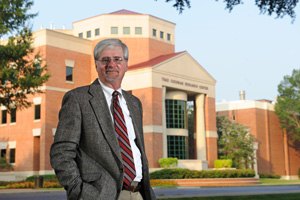
Larry Walker, director of the National Center for Natural Products Research at the University of Mississippi, is in Switzerland this week to present some of his research team's work to the Expert Scientific Advisory Committee of the Medicines for Malaria Venture. UM photo by Kevin Bain.
… International foundation short-lists UM R&D proposals
OXFORD, Miss. – Malaria, one of the world’s most widespread infectious diseases, takes the lives of almost 1 million people a year. University of Mississippi researchers have been working for more than 20 years on antimalarial drugs in hopes of developing one that will save some of those lives.
Larry Walker and Babu Tekwani are to arrive in Geneva, Switzerland, Sept. 12 to present some of their research team’s work to the Expert Scientific Advisory Committee of the Medicines for Malaria Venture in hopes of winning continued funding for the project.
Led by Walker, director of the National Center for Natural Products Research at UM’s School of Pharmacy, the research is aimed at improving the malaria drug primaquine. For 50 years, primaquine has been the only drug available for the treatment and prevention of relapsing malaria, but the drug causes side effects to some individuals who have an enzyme deficiency. The UM project focuses on reducing the toxicity of primaquine, which is a mixture of two isomers, or molecules that have the same composition but are mirror images of each other.
The idea is to test whether one of the isomers will kill the malaria parasites but produce fewer side effects for humans.
“We’re trying to make it better, safer and more effective,” Walker said. “Our consortium put in five proposals to MMV (Medicines for Malaria Venture), and three of those were short-listed for more detailed presentations in Geneva because they were viewed as exciting. Another project for Cumberland Emerging Technologies that we helped with is centered on a related drug, and it was also selected.”
Cumberland Emerging Technologies, a subsidiary of Nashville-based Cumberland Pharmaceuticals, works with universities to bring promising compounds through the development process and on to commercialization. In fact, Leo Pavliv, who is head of product development and operations for CET and Cumberland Pharmaceuticals, is accompanying Walker and Tekwani to Geneva.
Walker said he hopes to develop a drug that is safe for children and pregnant women, which is greatly needed in public health programs in Africa.
The Medicines for Malaria Venture is a nonprofit public-private partnership, established as a foundation in Switzerland in 1999. Its mission is to reduce the burden of malaria in disease-endemic countries by discovering, developing and facilitating delivery of new, effective and affordable antimalarial drugs.
Consisting of experts from both industry and academia, the Expert Scientific Advisory Committee helps identify the best projects worthy of inclusion in the portfolio and continues to monitor progress through an annual review of all projects. Committee members cover the full range of expertise required to assess projects in the extremely complex process of drug research and development.
Tekwani, a principal research scientist at UM, said he is happy to have the opportunity to present the work on the new antimalarial drug discovery program before the committee.
“MMV has the best resources and contacts required for clinical development of antimalarial drugs,” Tekwani said. “The partnership with MMV shall expedite our efforts for taking the antimalarial drug discovery program from bench-side (discovery) to bedside (clinical use).”
For this program, UM has also proposed a partnership with the Faculty of Tropical Medicine at Mahidol University in Bangkok, Thailand. That institution has pioneered large randomized clinical trials of antimalarial drugs in malaria-endemic areas based on pharmacokinetic and pharmacodynamic principles accepted by the World Health Organization.
Because malaria poses a threat to American service men and women when stationed in disease-endemic countries, the U.S. Department of Defense has for the past three years provided UM with some $2 million annually to support this antimalarial R&D consortium, and the team has been working closely with personnel at the Walter Reed Army Institute of Research.
The researchers also received a $100,000 Grand Challenges Explorations grant in 2009 from the Bill and Melinda Gates Foundation to study primaquine. The Grand Challenges Explorations grants help scientists around the world explore bold and largely unproven ways to improve health in developing countries.
For more information on the School of Pharmacy, visit http://www.pharmacy.olemiss.edu.